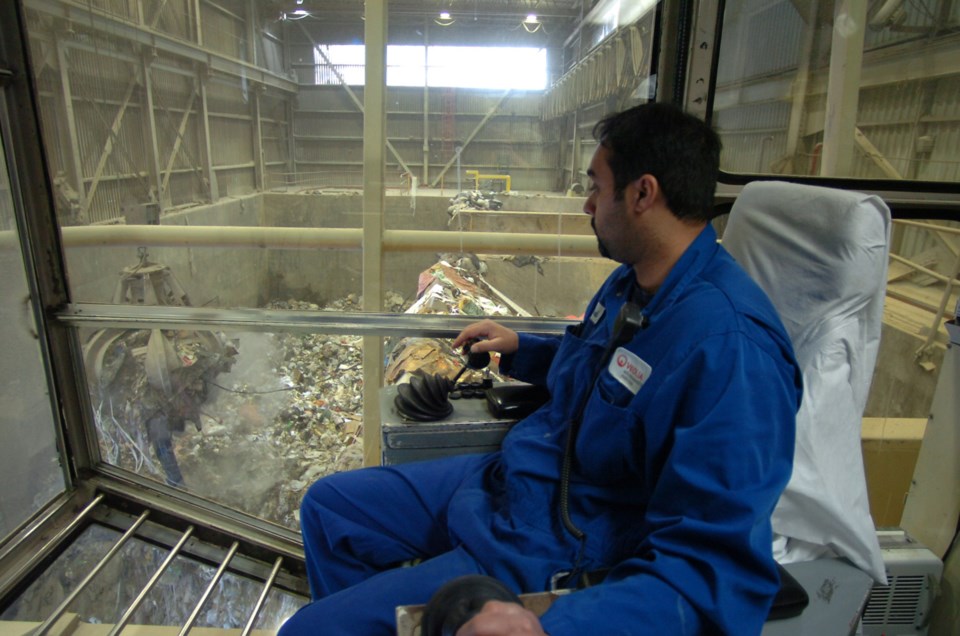Metro Vancouver's sole incinerator in Burnaby has failed several toxicity tests in its bottom ash - as a spike in cadmium was found in some samples.
Recently, Metro Vancouver's general manager of solid waste services, Paul Henderson, reported over the year that 19 out of 479 (about four per cent) bottom ash samples not only failed the toxicity testing but, in some cases, exceeded more than twice of the regulatory limit.
"The waste-energy facility in Burnaby processes waste from around the region, and there's a whole series of testing programs in place to ensure the protection of the environment," Henderson told the NOW. "And one of the things that is important about the facility is what goes into the waste stream."
The failed tests are linked to the cadmium found in the samples, which is a toxic metal linked to cancer, respiratory problems and kidney failure.
Henderson's report noted that cadmium levels in the waste stream are most likely associated with the disposal of household batteries, including rechargeable batteries and electronic device batteries.
"Earlier this year, we started to see individual anomalous results related to that ash," he said about the 45,000 tonnes of bottom ash out of 300,000 tonnes of garbage. "We saw some individual samples ... above the regular threshold, and we started stockpiling the ash at the Vancouver landfill. What we do now is test the ash. We want to wait until we see what the results of that ash-testing program are, and we'll manage the testing appropriately."
Henderson said the samples, which may concern the public to hear contain carcinogens, are not at a level that worries Metro Van.
"We've dramatically increased the number of samples we take, and I think that's part of what's happening, is we have a much larger data set, and we're starting to see some anomalous results," he said. "It's important to communicate back to people that they're part of the problem and potentially part of the solution for things like batteries, which just don't belong in garbage."
However, the mayor of Chilliwack, and Fraser Valley Regional District board chair, said the report is unsettling and demonstrates the environmental problems that inevitably arise when garbage is burned.
"We've been talking about this for seven years now," Sharon Gaetz said. "We've been calling on Metro Vancouver for seven years not to walk in this direction."
Gaetz said her district has asked Metro Van to be a "good neighbour," as whatever Metro Van sends Fraser Valley's way is trapped by the mountain.
"Farmers have great concern of this effect on their crops and food that gets brought to your table because it comes through the air and settles on top of our crops," she said. "Burning garbage simply doesn't make sense. We know that there are cheaper, greener and more energy-efficient approaches to waste management."
Other alternatives include maximizing waste reduction and material discovery, which Fraser Valley is looking into as waste-recovery facilities are broadening their capacity for recycling materials as technology advances.
Russ Black is the vice-president of corporate development for Belkorp Environmental Services Inc. He has been approaching different municipalities highlighting the key benefits of advanced material recovery facilities as an alternative to incineration.
Black said they've invested in a California-based project that has improved technology at a facility where the process involves breaking a garbage bag and removing the recyclables.
"It was something we thought Metro Vancouver would be compelled to do because they had that in their plan," Black told the NOW. "It turns out they're doing everything they can to quash it."
He said a certain amount of paperboard and plastics is required to fuel an incinerator and make it economical.
"If you have a ton of garbage, 300 kilograms of that ton of garbage will be ash that ironically must be landfilled, you can't get away from the landfill," he said. "About 250 kg of that one ton ... is evaporated as water. But 450 kg of what's left is particulates, which get loaded into the airshed, and that's what the Fraser Valley is not wanting - our food is growing in the valley."
Black said his company, and others like it, have tried to build at least three material-recovery facilities but have been met with roadblocks by Metro Vancouver.
Metro Vancouver's proposed bylaw 280 is restrictive and, if approved, will impair the implementation of advanced material-recovery facilities in the region.
However, in a previous interview with the NOW, Burnaby Mayor Derek Corrigan said there is no real alternative to garbage incineration.
"I just don't know if there's any other alternative but to expect some degree of incineration," said Corrigan, also the vice-chair of Metro Van's zero-waste committee. "We do it the cleanest way possible."
He was responding to the Canadian Centre for Policy Alternatives and Wilderness Committee's study released in April, Closing the Loop: Reducing Greenhouse Emissions Through Zero Waste in B.C.
The study criticized the practice of burning garbage and states that it was not only worse than coal burning and bad for air quality, but it also creates a demand for more waste consumption.
Corrigan said the study was a Pollyanna approach to reality and that a 100 per cent recycling rate is unrealistic and unlikely to happen any time soon.
Corrigan was unable to return the Burnaby NOW's request for comment as he is currently touring waste facilities for Metro Vancouver in Europe.



